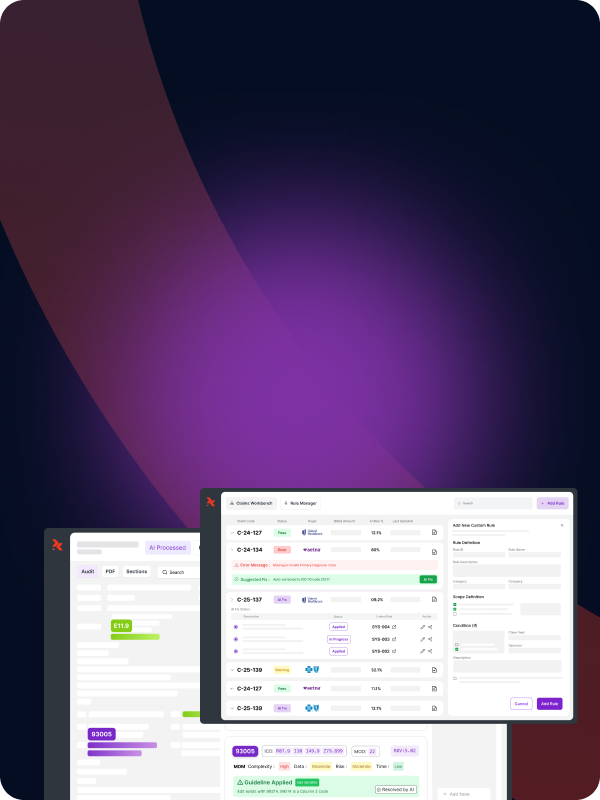.webp)
How Artificial Intelligence is Transforming Medical Coding and Revenue Cycle Management

In today’s fast-evolving healthcare landscape, artificial intelligence (AI) is playing a pivotal role in revolutionizing how medical coding is conducted. What was once considered an experimental technology limited to large academic centers is now becoming a necessity for health systems of all sizes. The integration of AI into medical coding processes not only enhances the efficiency and accuracy of coding but also significantly impacts the broader realm of revenue cycle management (RCM). This blog explores how AI is reshaping the medical coding industry, addressing both the challenges and the immense potential it brings to healthcare providers.
The Growing Importance of Medical Coding in Healthcare
Medical coding is the backbone of healthcare revenue cycle management. It involves translating clinical documentation into standardized codes that are essential for billing, reimbursement, and regulatory compliance. Accurate coding is crucial for healthcare providers to ensure that they receive appropriate payments for services rendered. However, the complexity and volume of coding tasks have increased over the years, leading to significant challenges for both physicians and professional medical coders.
Traditionally, the burden of coding has fallen on physicians and trained coders who must navigate an intricate web of coding rules, payer-specific guidelines, and regulatory requirements. This manual process is not only time-consuming but also prone to errors, which can result in claim denials, delayed payments, and increased administrative costs. The introduction of AI into this process promises to alleviate many of these challenges by automating routine tasks and providing higher accuracy in coding.
AI in Medical Coding: A Game Changer
Artificial intelligence, particularly in the form of machine learning and natural language processing (NLP), is transforming medical coding by automating many aspects of the coding process. AI systems are capable of analyzing vast amounts of clinical data, identifying relevant information, and assigning the correct medical codes with minimal human intervention.
One of the most significant advantages of AI in medical coding is its ability to continuously learn and adapt. AI-driven systems can analyze historical billing data and clinical notes to identify patterns and correlations that are often missed by human coders. Over time, these systems become increasingly accurate, reducing the likelihood of coding errors and improving overall coding efficiency.
Autonomous Coding: Reducing the Burden on Physicians
Physicians often face the dual responsibility of providing patient care and ensuring that their documentation is accurately coded for billing purposes. This added burden can lead to burnout and reduced time spent with patients. AI offers a solution by automating the coding process, allowing physicians to focus on what they do best—caring for patients.
Autonomous coding systems use AI to predict the most likely codes based on the clinical documentation provided by the physician. These systems can present a narrowed-down list of codes that are most relevant to the procedure or diagnosis, making it easier for physicians to review and select the correct code. In some cases, AI can even eliminate the need for physician involvement in coding altogether, freeing up valuable time for patient care.
Enhancing the Role of Professional Medical Coders
While AI has the potential to automate many routine coding tasks, it is not intended to replace human coders. Instead, AI serves as a powerful tool that enhances the capabilities of professional medical coders, allowing them to operate at the top of their licensure. For example, routine cases such as screening mammograms or standard procedures can be handled autonomously by AI, while more complex cases that require a deeper understanding of clinical nuances are referred to human coders.
This collaboration between AI and human coders not only improves efficiency but also ensures that coding is both accurate and compliant with the latest standards. By automating routine tasks, AI allows coders to focus on cases that truly require their expertise, ultimately leading to better coding outcomes and reduced administrative costs.
AI-Driven Optimization in Revenue Cycle Management
The impact of AI on medical coding extends beyond the coding process itself; it also plays a crucial role in optimizing the entire revenue cycle management. By improving the accuracy and efficiency of coding, AI helps healthcare providers streamline their billing processes, reduce claim denials, and accelerate payment cycles. Additionally, AI-driven insights can identify opportunities for clinical documentation improvement, ensuring that the documentation supports the codes assigned and meets payer requirements.
AI can also be used to optimize the routing of cases that require manual review, directing them to the most appropriate coders based on their expertise and experience. This targeted approach not only improves coding accuracy but also enhances the overall efficiency of the RCM process, leading to significant cost savings for healthcare providers.
Ensuring Compliance with Evolving Coding Standards
Compliance with coding standards is a critical aspect of medical coding and revenue cycle management. Healthcare providers must stay up-to-date with the latest coding guidelines and payer-specific requirements to avoid claim denials and potential legal issues. AI-driven coding systems are designed to stay current with these evolving standards, ensuring that codes are accurate and compliant.
For example, AI can be programmed to recognize changes in coding rules and automatically update its algorithms to reflect these changes. This proactive approach to compliance reduces the risk of coding errors and helps healthcare providers avoid costly penalties associated with non-compliance.
Scalability and Technical Efficiency
As healthcare organizations grow, so does the volume of medical coding tasks. AI offers a scalable solution that can efficiently handle large volumes of coding without the need to hire additional staff. This scalability is particularly beneficial for large health systems and multi-specialty practices that deal with a high volume of coding tasks on a daily basis.
In addition to scalability, AI-driven coding systems are technically efficient, capable of processing and analyzing data at speeds that far surpass human capabilities. This efficiency translates into faster turnaround times for coding and billing, ultimately leading to improved cash flow and financial performance for healthcare providers.
The Future of AI in Medical Coding and Beyond
The future of AI in medical coding is promising, with advancements in machine learning, NLP, and other AI technologies continuing to drive innovation in this field. As AI systems become more sophisticated, they will be able to handle increasingly complex coding tasks, further reducing the burden on physicians and coders while improving the accuracy and efficiency of coding processes.
Moreover, the potential applications of AI extend beyond medical coding. AI-driven technologies can be leveraged to optimize other administrative functions within revenue cycle management, such as auto-adjudication, automated pre-authorization, and payer-certified coding algorithms. These advancements have the potential to transform the entire RCM process, driving efficiencies and reducing costs across the healthcare industry.
AI as a Partner, Not a Replacement
While AI has the potential to automate many aspects of medical coding, it is important to recognize that AI is not a replacement for human expertise. Instead, AI should be viewed as a partner that augments the capabilities of healthcare professionals, allowing them to achieve better outcomes and improve the quality of care.
Human-in-the-loop systems, where AI works alongside human coders and physicians, are likely to become the norm in healthcare. These systems combine the strengths of AI—such as speed, accuracy, and scalability—with the clinical expertise and judgment of human professionals. The result is a more efficient, accurate, and patient-centered approach to medical coding and revenue cycle management.
Conclusion
The integration of artificial intelligence into medical coding and revenue cycle management is a game changer for the healthcare industry. By automating routine tasks, enhancing accuracy, and ensuring compliance with evolving standards, AI-driven coding systems are helping healthcare providers reduce administrative costs, improve financial performance, and focus more on patient care. As AI continues to evolve, its impact on medical coding and RCM will only grow, paving the way for a more efficient, effective, and patient-centered healthcare system.
At RapidClaims, we are committed to harnessing the power of AI to transform the medical coding process, enhance operational efficiency, and drive better outcomes for healthcare providers and patients alike. Our AI-driven solutions are designed to streamline coding, reduce costs, and ensure compliance, making us a trusted partner in the ever-changing healthcare landscape.
%201.png)









